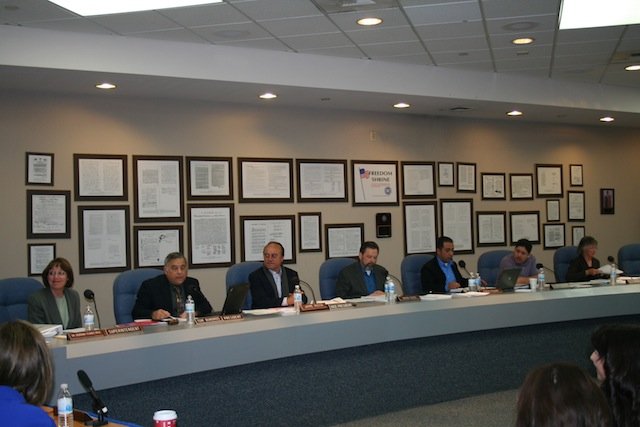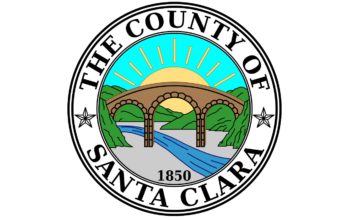The Gilroy Board of Education unanimously approved a $16,500 contract for a parcel tax feasibility study following heavy deliberation during Thursday’s meeting.
While expressing her reluctance to proceed with the contract because “it’s costing us,” Board Co-President Rhoda Bress recalled her frustration last year when the public was denied the opportunity to vote on Gov. Jerry Brown’s 2011 tax initiative. The plan – which would have generated much-needed funding for schools – never made it to the ballot.
“We have a responsibility to communicate to the public what the problem is. We know what some of the consequences are going to be if we don’t find some of the solutions – and the public has a right to choose whether it wants to support this or not,” said Bress. “If the public chooses not to support this, then that’s the decision and we get the kind of school district that the public has decided upon.”
A forecasted $3.2 million to $7.2 million loss in state funding next year has prompted GUSD officials to seriously consider a parcel tax for the first time.
The School Board unanimously approved 7-0 during Thursday’s regular meeting a $16,500 contract with San Francisco-based consulting firm TBWB Strategies, which will guide the district in conducting a two-month study to determine the feasibility of putting a parcel tax before voters in order to obtain local funding for Gilroy schools.
It was noted during TBWB’s presentation that Rebecca Wright, assistant superintendent of business services for GUSD, made it very clear the district will not tolerate any “surprise” fees outside of the $16,500.
The contract does not include the cost of conducting a poll, something TBWB estimates will cost the district between $24,000 and $30,000, depending on the sample size and survey length.
While Trustee Mark Good ultimately cast a vote in favor of the study, he voiced reluctance over shelling out between $40,000 to $50,000 to explore what he fears could already be a “dead horse.”
The amount of $50,000 amount could help fund the endangered Adult Education program for a year, said Good, who likened the push for a parcel tax push to “going to Vegas and betting on something with not very good odds.”
“Do we want to spend $50K to see what public sentiment is?” he asked. “I have an opinion of what it’s going to be, and it’s going to be negative.”
Trustees have been presented with examples of different parcel tax amounts, which include $50, $100, $150, $200, $250 and $300 per year. A $50 parcel tax, for example, would provide $735,000 in revenue annually for the term of the parcel tax. A $300 parcel tax would provide GUSD with $4.4 million annually.
“I’m on the other side of the fence. On one hand, I know we need the money – a parcel tax would be a good thing for this district. But the reality is that $50 to $75 annually isn’t going to bring in a lot,” Good said.
He was referring to the fact that a probable parcel tax for Gilroy’s demographics would fall between $50 and $75, according to TBWB.
In light of some ominous skepticism regarding the community’s receptiveness toward being saddled with a property tax, Board Vice President Jaime Rosso was adamant about perusing one of the district’s only revenue-generating options (a parcel tax) before giving up on it.
“If we knew all those answers now we could just throw in the towel and do nothing to empower ourselves to decide that we are going to do whatever it takes,” he said. “There’s no guarantees, but it’s up to us to lead the charge – and if we’re not going to lead the charge, then who is?”
While he came into Thursday’s meeting “on the edge” about the contract, Board Co-President Tom Bundros eventually echoed Rosso’s mindset.
“The local paper said the community wouldn’t support a parcel tax if it was business as usual,” said Bundros, referring to a recent editorial printed in the Dispatch. “If we were to come up with something outside the box that generates some excitement, then we would probably have a chance of succeeding.”
Rosso hammered on the fact that a fully functioning, well-oiled school district instigates a continuos ripple of benefits to the entire city of Gilroy. Demonstrating school achievement and progress with steady test score improvements, for example, buttresses local economic development by adding value to Gilroy real estate, Rosso said.
“For us to sit on our hands, in my opinion, would be a disservice to the community,” said Rosso. “We’re delivering results at our schools…(but) we can’t keep asking everybody to do more and more while giving (staff) less and less.”
TBWB Strategies Partner Jared Boigon touched on this, explaining that one of his firm’s deliverables entails aiding the district in helping the community understand “what we’re dealing with here” – in addition to other logistics such as polling analysis, models for election timing and communication strategies.
Even if the parcel tax doesn’t pass, Rosso underlined the eternally yo-yoing state budget crisis that will likely plague school funding for years down the road; a headache trustees have referred to in the past as “deferral hokey-pokey.”
“It’s like running for (office) and saying, ‘I lost, therefore forget about it,” likened Rosso. “You come back again. You do what you need to do. If we’re not willing to make the effort, then let’s throw in the towel and wait for what the governor dishes up, and don’t complain about it.”














